Books
Books
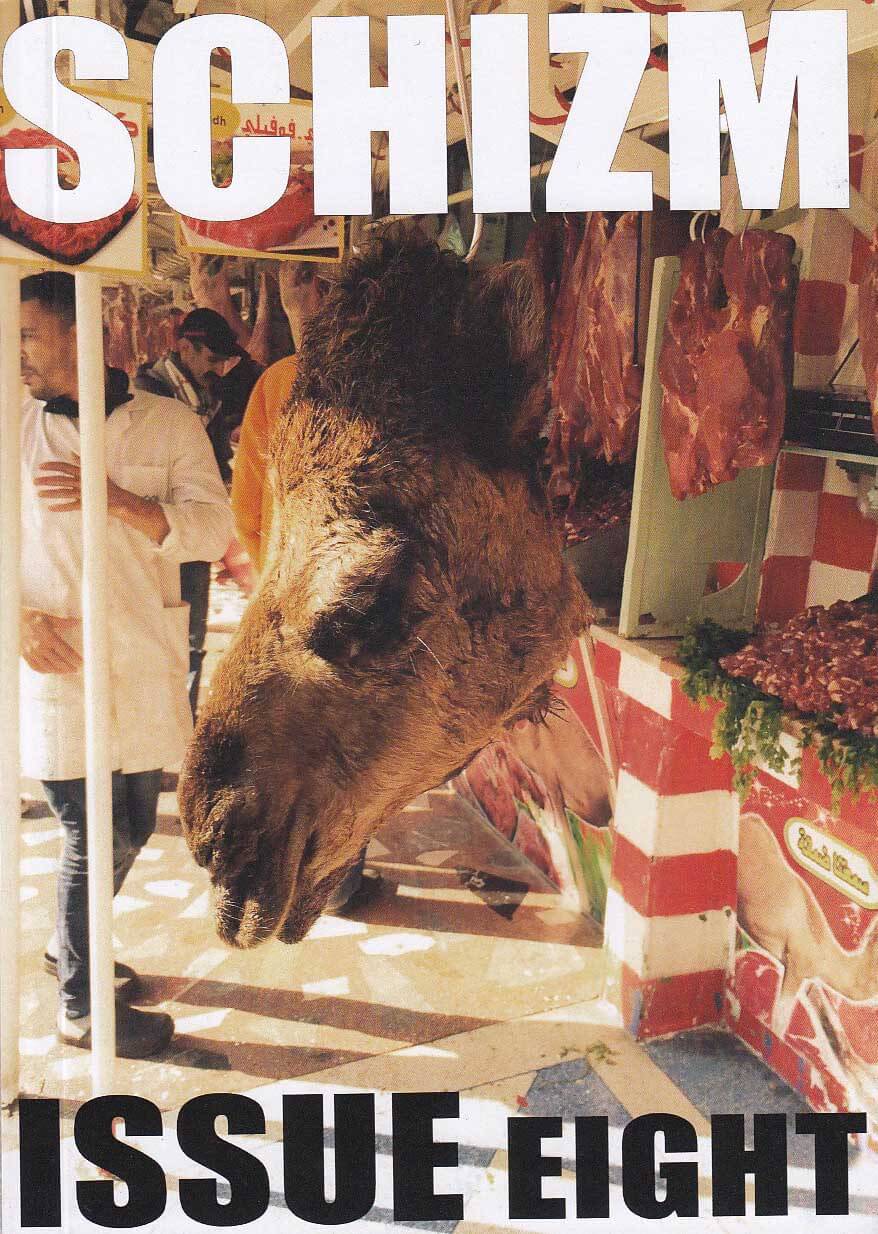
#8 Schizm Magazine
SKEPTICAL UNCERTAINTIES (false truths & honest lies)
Contributions by Bob Ajar, Pedro Diego Alvarado, Aureliano Alvarado, Sam Basu, Manuela Barczewski, Iphgenia Baal, John Chilver, Paul Philipp Heinze, Thomas Helbig, Jaakko Juhani Karhunen, Paul Johnson, George Macbeth, Christoph Meier, Sascha Mikloweit, Mocellin Pellegrini, Pages, Tomas Rydin, Adam Rompel, Fiona Sarison, Barry Sykes, Eleanor Vonne Brown, Markus Vater. Schizm Magazine invites contemporary artists and writers to contribute pages in response to a theme which, as the title implies, engages with a paradoxical idea. Each issue combines archival material with original works and texts sent in by between ten to thirty contributors.

#7 Schizm Magazine
UPWARDLY/DOWNWARDS.
Contributions by Bob Ajar (NY), Jessica Bard (NY), Sam Basu (FR), Paul Birbil (NY), David Burrows (LND), John Chilver (LND), Lisa Conrad (CA), Nina Katchadourian (NY), James Chance (MEX), Jon Kinzel (NY), Roy Kortick (NY), Emily Kuenstler (CA), Cedar Lewisohn (LND), Drea Marks (MA), Francesca Mannoni (NY), & Elizabeth Tisdale (NY).
Schizm Magazine invites contemporary artists and writers to contribute pages in response to a theme which, as the title implies, engages with a paradoxical idea. Each issue combines archival material with original works and texts sent in by between ten to thirty contributors.

#6 Schizm Magazine
ACCESS/EXCESS (coercion, proliferation & mutation)
Contributions by Bob Ajar, Maziar Afrassiabi, Sam Basu, Matt Calderwood, John Chilver, Rhys Coren, Patrick Coyle, Arnaud Desjardin, Catherine Hughes, Thomas Lock, Paul McDevitt, Sean Parfitt, Cornelius Quabeck, Chico Stockwell and Katarina Zdjelar.
Schizm Magazine invites contemporary artists and writers to contribute pages in response to a theme which, as the title implies, engages with a paradoxical idea. Each issue combines archival material with original works and texts sent in by between ten to thirty contributors.
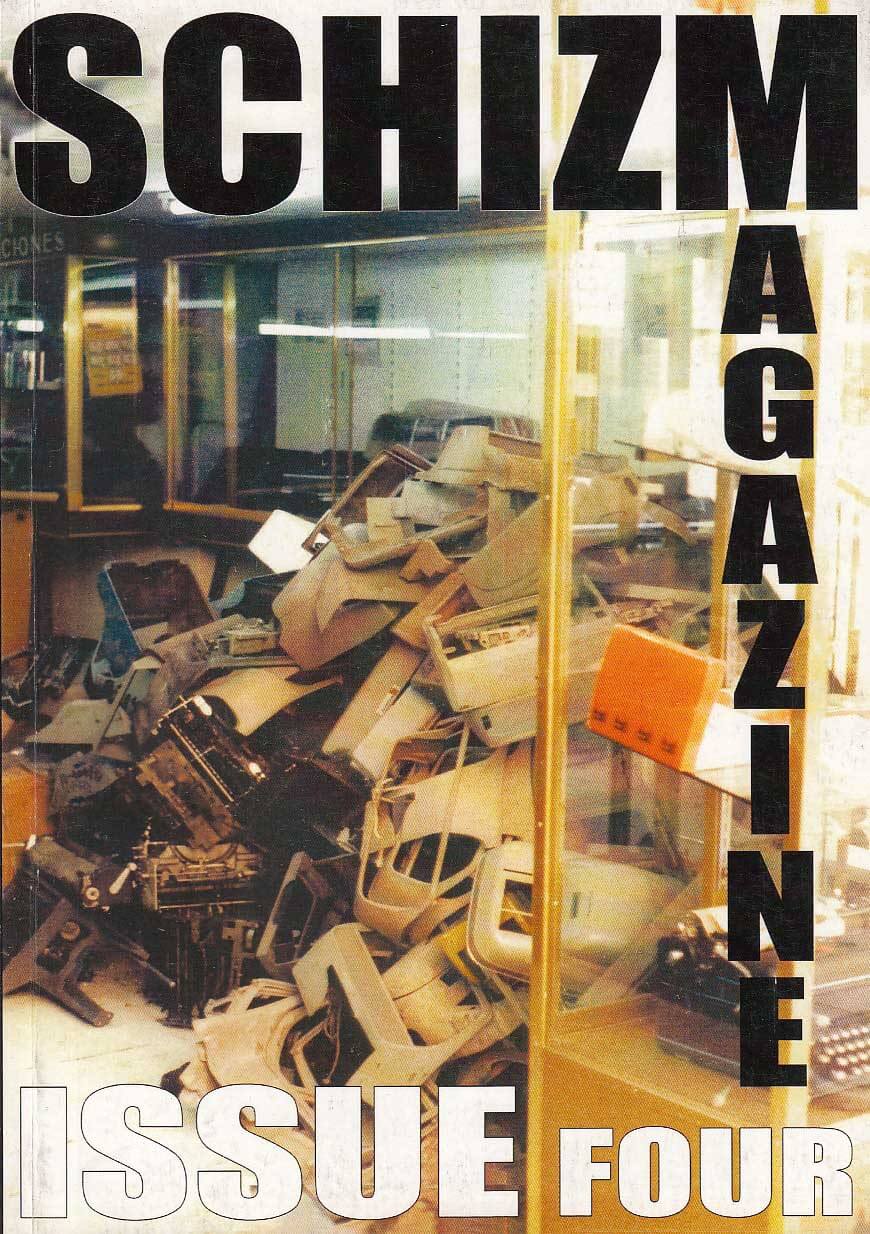
#4 Schizm Magazine
NOW (obsolescence, regeneration & criticality)
CONTRIBUTORS: Bob Ajar, Shahin Afrassiabi, Michael Andreae, Noah Angell, Caline Aoun, Mike Ballard, Sam Basu, Manuela Barczewski, Paul Buck, John Chilver, Ami Clarke, Craig Cooper, Alexandre Da Cunha, Doyle and Mallinson, Alasdair Duncan, Deborah Farnault, Charles Gute, Michael Hampton, Friederike Hamann, Ed Jones, Dean Kenning, Sara Knowland, Cedar Lewisohn, Leonard Manasseh, Alastair Mackinven, Sascha Mikloweit, Anne Redmond, Giorgio Sadotti and Stephen Setford.
Schizm Magazine invites contemporary artists and writers to contribute pages in response to a theme which, as the title implies, engages with a paradoxical idea. Each issue combines archival material with original works and texts sent in by between ten to thirty contributors.

The Straight Mind
A collection of political, philosophical, and literary essays from the acclaimed novelist and French feminist writer Monique Wittig. Monique Wittig's first collection of essays centering on women's struggle for liberation from sexism and classism. These nine essays comprise a thoughtful and unique approach to the study of historical materialism and dialectics, and transverse philosophical, political, and literary theory.
Monique Wittig describes this collection as a focus on "lesbian materialism," in which she examines men and women as distinct classes rather than as "essentialist" categories. "Lesbians are not women," writes Monique Wittig, and she presents powerful ideas about how the idea of "woman" is socially constructed and used to convey certain images. It is not enough, she argues, to transform economic oppression because not all oppression is, at the source, economic.
Sexism will continue to exist even in a society where all people have equal economic opportunities. Only by transforming our thought processes, and in turn, our language, can we transform our society into one in which there is no longer the dominant and the dominated: "In other words, this means there cannot any longer be women and men, and that as classes and categories of thought or language they have to disappear, politically, economically, ideologically." Controversial and abstract, these are essays that challenge and provoke on both intellectual and emotional levels.
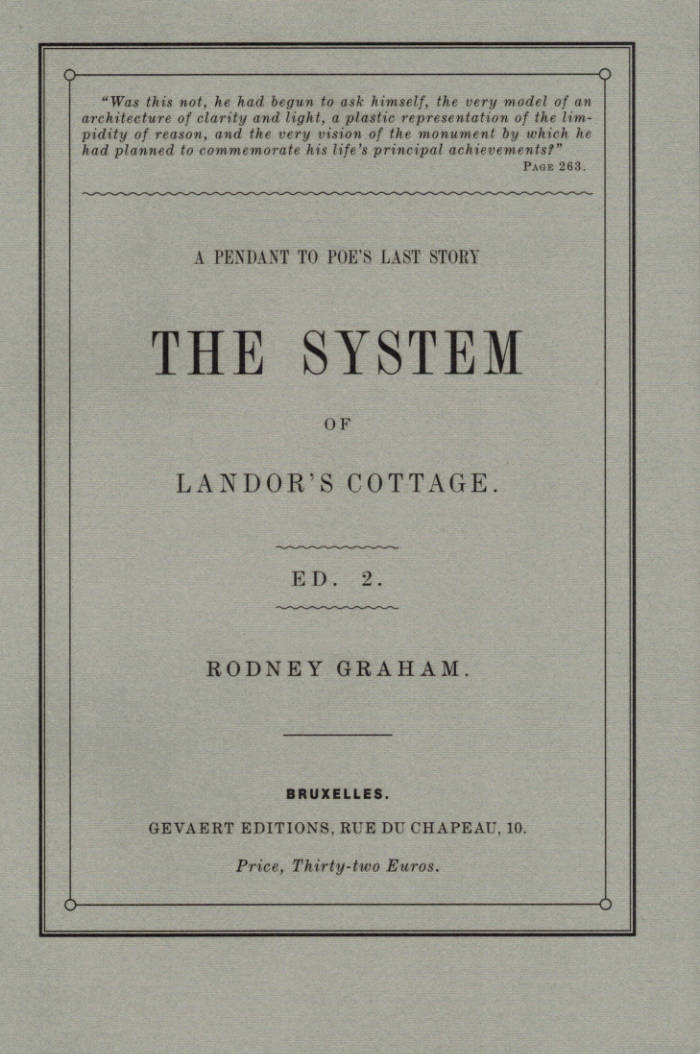
The System of Landor's Cottage. A Pendant to Poe's Last Story
Rodney Graham's The System of Landor's Cottage: A Pendant to Poe's Last Story is the most ambitious of the textual interventions that contributed to Graham's emergence onto the international art scene in the 1980s.
Part 'pataphysical investigation, part Roussellian exercise, the text begins with Edgar Allan Poe's short story "Landor's Cottage: A Pendant to 'The Domain of Arnheim,'" which describes a waylaid traveller's encounter with an uncannily pristine landscape and cabin in the Hudson River Valley. Into this short tale, which numbers less than twenty pages in most editions, Graham inserts an entire novel centered around an annex to Poe's original structure that houses a fantastical machine.
Through a complex set of nested tales, the origins of the machine become clearer but no less magical, and readers will be held rapt by accounts of architectural wonders, a mysterious cipher, and the romance of impossible science.

A Generous Spirit: Selected Work by Beth Brant
Sinister Wisdom and Inanna Publications & Education Inc. are proud to present a new volume of the work of Native American writer Beth Brant, edited by Janice Gould.
A Generous Spirit: Selected Work by Beth Brant collects the writing of Beth Brant, Mohawk lesbian poet, essayist and activist. During her life, Brant’s work gave voice to an often unacknowledged Two-Spirit identity, and today, her words represent continued strength, growth, and connection in the face of deep suffering.
A Generous Spirit is Brant’s portrait of survival and empathy at the intersection of Native American and lesbian experience. A Generous Spirit recounts and enacts the continuance of her people and her sisters with distinct, organic voices and Brant’s characteristic warmth. Her work is a simultaneous cry of grief and celebration of human compassion and connection in its shared experience. Through storytelling, her characters wrest their own voices from years of silence and find communion with other souls.
With a substantial introduction by Janice Gould situating Brant in a broader political and literary context, a foreword by acclaimed Canadian poet Lee Maracle, and a moving afterword by scholar and poet Deborah Miranda, A Generous Spirit is a tribute to the influence of Brant on a generation of Indigenous writers.

Be Here Now

My Emily Dickinson

Vampyroteuthis Infernalis
Flusser introduces an infernal creature from the oceanic abysses, who slowly emerges, not from the oceans, but from man's own depths to gaze spitefully into his eyes and reflect back at his own existence.
Originally published only in German in 1987, this version has been edited and translated by Rodrigo Maltez Novaes, Ph.D. candidate at the European Graduate School, Saas-Fee, under the supervision of Prof. Dr. Siegfried Zielinski, from the original, unpublished and extended Brazilian-Portuguese version of the manuscript recently found at the Vilém Flusser Archive at the Universität der Kunst, Berlin. This edition is also accompanied by a selection of previously unpublished excerpts from Flusser's correspondence with Milton Vargas and Dora Ferreira da Silva, with whom he discussed the development of the present text.

Cyberpositive
0(rphan)d(rift>)'s Cyberpositive is an experimental sci fi theory-fiction that streams a group of asked and unasked contributors writing, sampled and edited by 0D's Maggie Roberts. It was published in 1995 with support from Nick Land and Cabinet Editions, serving as a manifesto and as the catalogue for the debut exhibition of the same name. It came together in the spirit of much of 0D's visual work, bringing together processes of sampling and looping as well as the Burroughs text cut up technique, referring to a breakdown and reordering of language from a post human POV.

What's the Use?
In What’s the Use? Sara Ahmed continues the work she began in The Promise of Happiness and Willful Subjects by taking up a single word—in this case, use—and following it around. She shows how use became associated with life and strength in nineteenth-century biological and social thought and considers how utilitarianism offered a set of educational techniques for shaping individuals by directing them toward useful ends.
Ahmed also explores how spaces become restricted to some uses and users, with specific reference to universities. She notes, however, the potential for queer use: how things can be used in ways that were not intended or by those for whom they were not intended. Ahmed posits queer use as a way of reanimating the project of diversity work as the ordinary and painstaking task of opening up institutions to those who have historically been excluded.
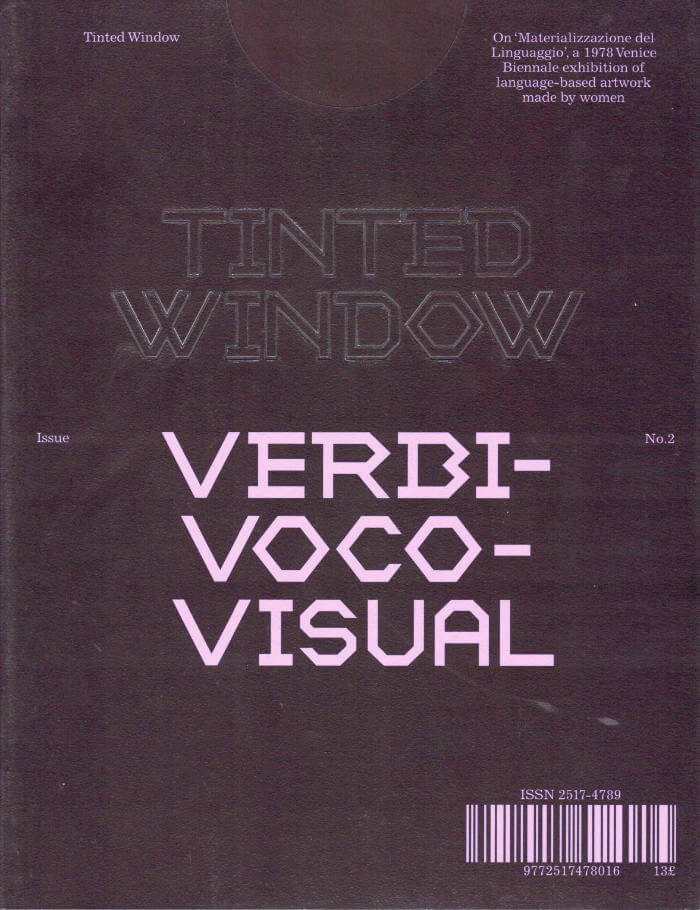
Tinted Window #2 : Verbivocovisual
This issue is dedicated to 'Materializzazione del Linguaggio', a 1978 Venice Biennale exhibition curated by Mirella Bentivoglio. The exhibition comprised of work by over eighty women artists working in a huge range of media, but united in their interrogation of text, voice and language. After the smashing hit of their Hervé Guibert No.1 issue, Tinted Window continues its focus on a single subject with issue No.2: Verbivocovisual. In No.2, Tinted Window brings much of this work back to the fore where many artists have slipped into the footnotes of an exciting period in art history. But much beyond our focus on this iconic exhibition, the issue features new essays and art projects by some of the best artists working with text, voice and poetry today.
No.2 features new commissions, translations and reprints from: Holly Antrum, Jeremy Atherton Lin, Mirella Bentivoglio, Angela Bianchini, Daniela Cascella, Anne Carson, Paula Claire, Paul Clinton, William Cobbing, Constance DeJong, Karen Di Franco, Sholto Dobie, Gustavo Grandal Montero, Katalin Ladik, Daisy Lafarge, Rosanna Mclaughlin, Silvia Mejía, Hannah Regal, Giovanna Sandri and Sue Tompkins.
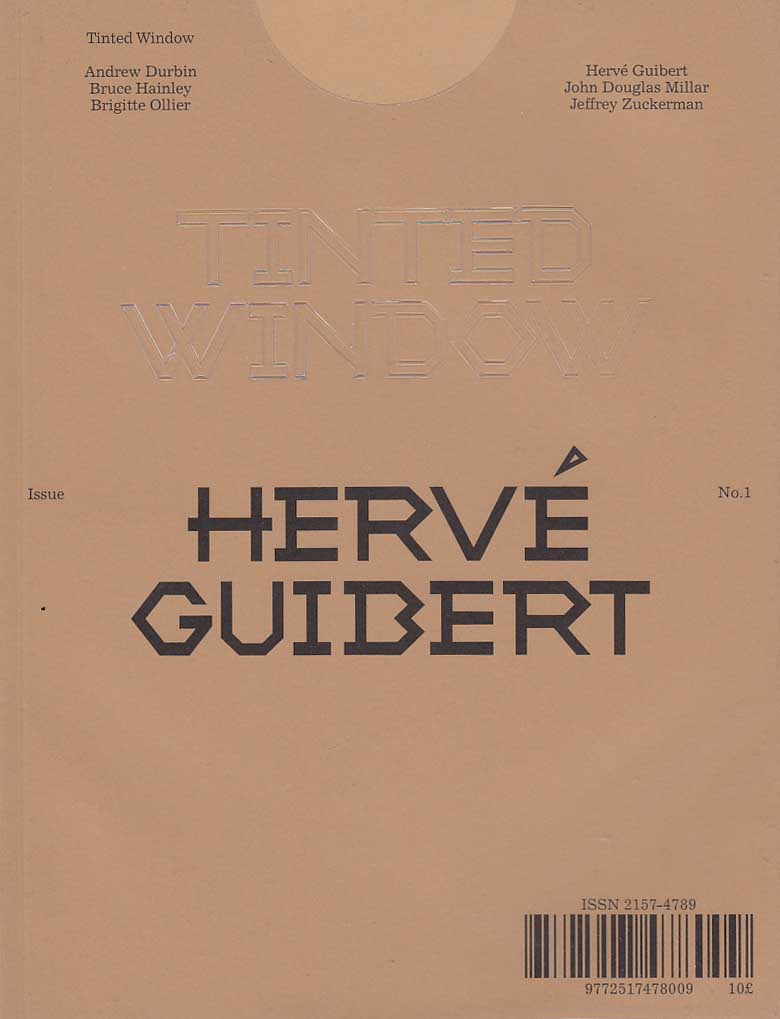
Tinted Window #1 : Hervé Guibert
No.1 explores the life and work of the writer, photographer and filmmaker Hervé Guibert. There is a travelogue to Greece in search of a portrait; reminiscences from those that knew him well or otherwise; first-time English translations of his work; a fine eye for his photographs; writing that deftly traces his last moments. Featuring Andrew Durbin, Louis Fratino, Hervé Guibert, Bruce Hainley, Brigitte Ollier, John Douglas Millar and Jeffrey Zuckerman.

The New Fuck You
Borrowing its name from the notorious '60s Ed Sanders magazine, Fuck You: A Magazine of the Arts, the editors have figured a way to rehone its countercultural and frictional stance with style and aplomb. A unique and provocative anthology of lesbian writing, guaranteed to soothe the soulful and savage the soulless. Includes Adele Bertei, Holly Hughes, Sapphire, Laurie Weeks, and many more.

My Mother Laughs (UK Edition)
In 2013, the filmmaker Chantal Akerman's mother was dying. She flew back from New York to Brussels to care for her, and between dressing her, feeding her and putting her to bed, she wrote. She wrote about her childhood, the escape her mother made from Auschwitz but didn't talk about, the difficulty of loving her girlfriend, C., her fear of what she would do when her mother did die. Among these imperfectly perfect fragments of writing about her life, she placed stills from her films. My Mother Laughs is both the distillation of the themes Akerman pursued throughout her creative life, and a version of the simplest and most complicated love story of all: that between a mother and a daughter.
Translated by Daniella Shreir with an introduction by Eileen Myles and afterword by Frances Morgan.
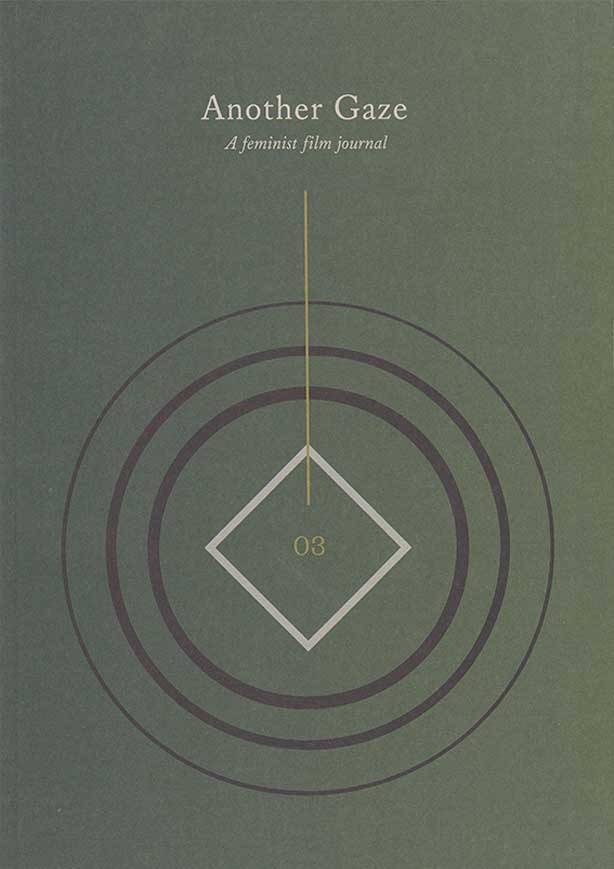
Another Gaze Journal 03
Including essays about Barbara Hammer, Agnès Varda, Camille Billops, Jane Arden, Penny Slinger, Ana Mendieta, Hito Steyerl, Mati Diop, Catherine Breillat, Carol Morley, Ulrike Ottinger, Charlotte Prodger, Charlotte Pryce, Rosalind Nashashibi & Lucy Skaer, Gloria Camiruaga, Margarethe von Trotta, Astra Taylor, Lina Wertmüller, and more.
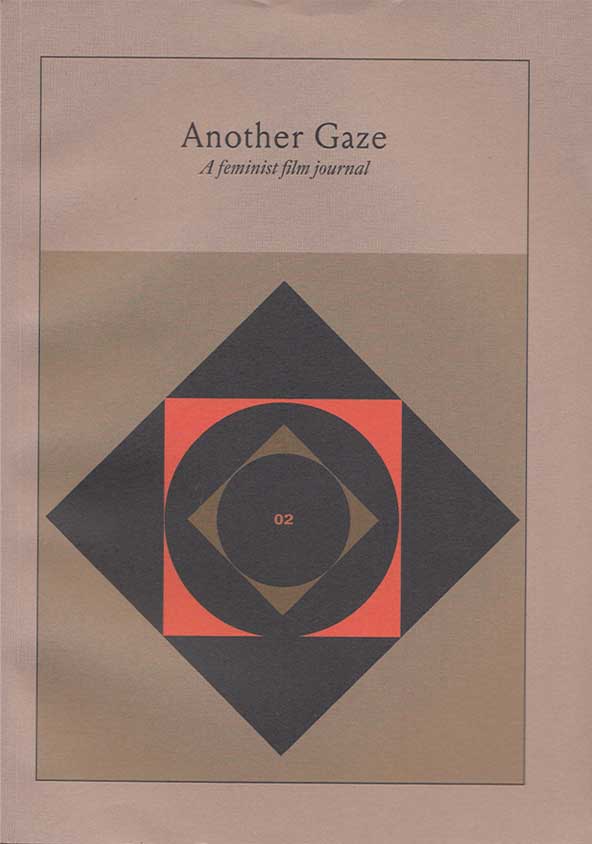
Another Gaze Journal 02
Including essays about Lucrecia Martel, Alice Rohrwacher, Cecilia Mangini, Chantal Akerman, Mika Rottenberg, Anocha Suwichakornpong, Agnès Varda, Barbara Hammer, Laida Lertxundi.

Another Gaze Journal 01
The first issue contains interviews with women including Carolee Schneemann, Mania Akbari, Laura Mulvey, Alice Diop, Bette Gordon, and Lis Rhodes. It contains pieces on the films of women including Kathleen Collins, Sally Potter, Chantal Akerman, Moyra Davey, Camille Henrot, Naomi Kawase, Germaine Dulac, Alice Guy-Blaché.
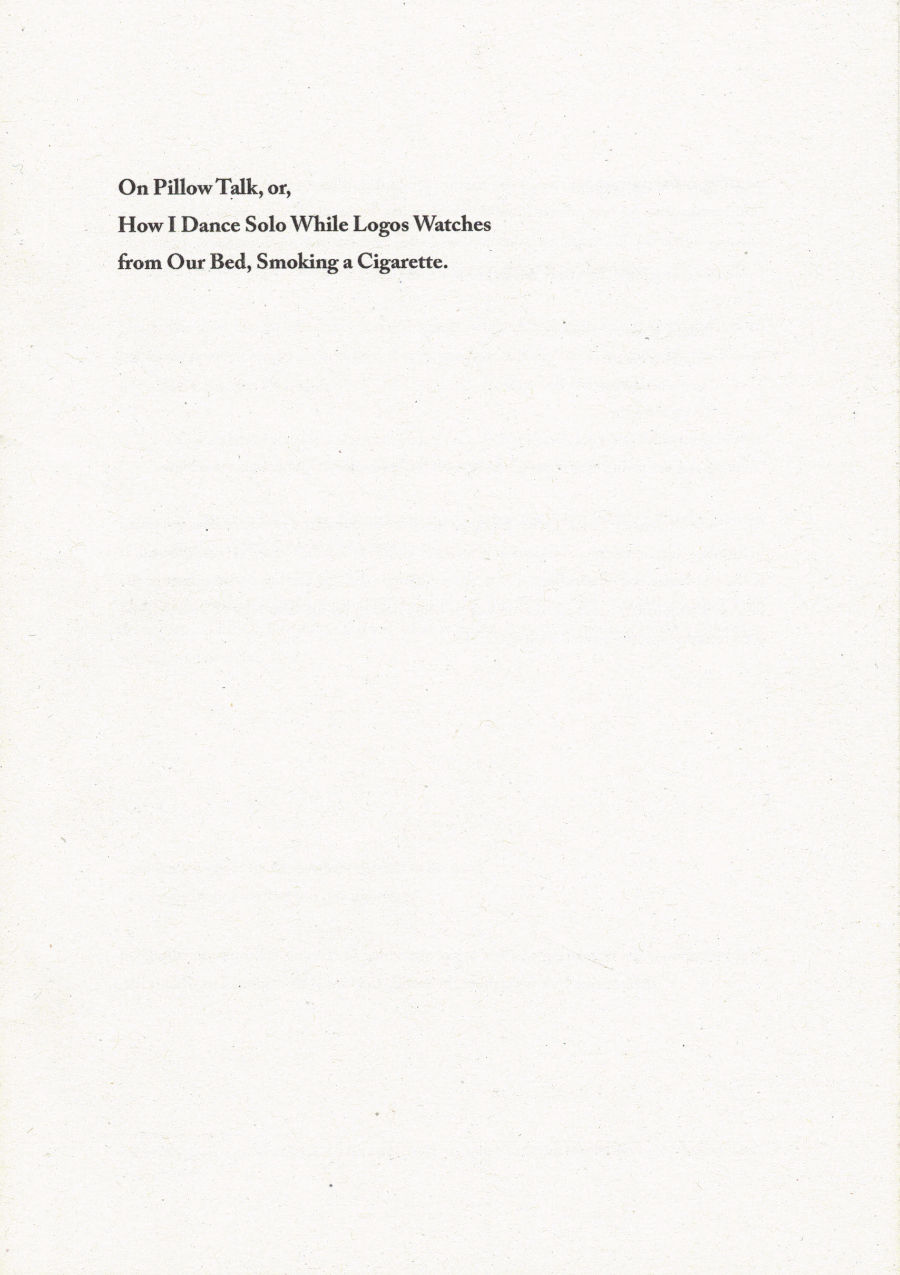
On Pillow Talk

Artificial Gut Feeling
If winning can only occur in a competition between equal opponents, someone who isn’t equal will need to adopt a different strategy and let go of the promise, or the curse, of victory. Anna Zett takes up the challenge in this collection of personal science fiction, registering the traces systems of power leave in the body, in its locomotory, nervous and digestive systems. Zett’s voice appears in several textual guises, addressing authority, resistance, trauma and the physicality of language. Dedicated to the feminist revolution, the post-socialist subject of Artificial Gut Feeling questions logocentric and capitalist beliefs about the economy of meaning. This book gathers together fists, guts and brains to gain a deeper understanding of the non-verbal roots of dialogue.
"This being is able to transform movement into speech. It winds itself about inside me like a thick snake and I have to use all my strength to let it spin and do what it does. When I wilfully try to stop it, it begins to whisper words to me and that is even more unpleasant. If I were to associate this gut feeling with an emotion, I would say disgust. But this disgust is not directly linked to your name."—Anna Zett
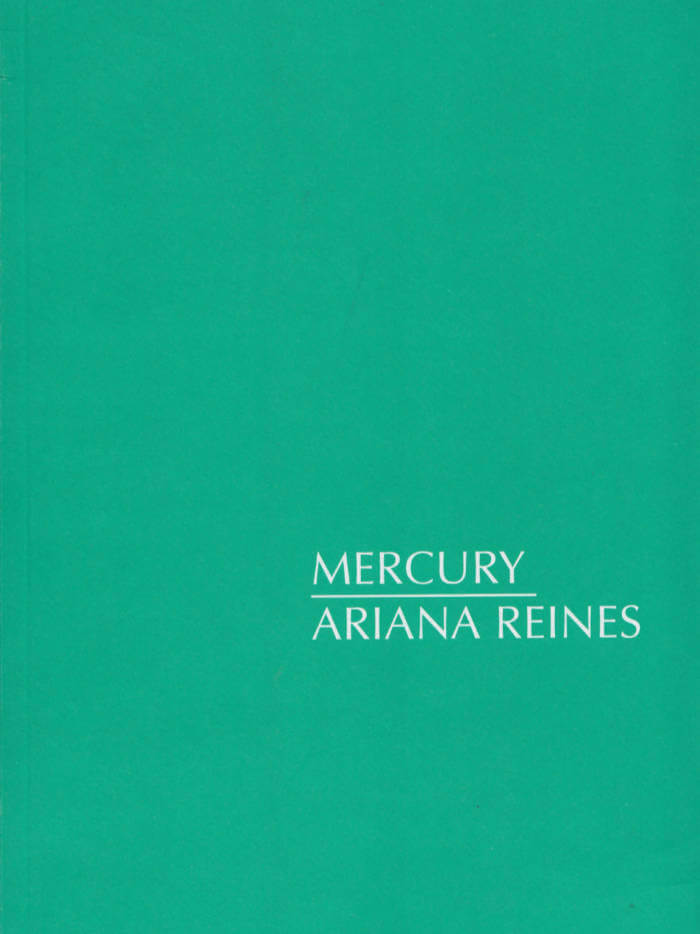
Mercury
Composed in the direct, accessible, consciousness-piercing style readers of Ariana Reines' first two books are wildly enamored of, Mercury comprises a group of long poems. These interlocking works speak to the substance and essence of what is said, transmitted, transacted, "communicated" between persons. Reines proposes that substance and essence are opposites, and explores this in contexts including commercial cinema and internet porn.
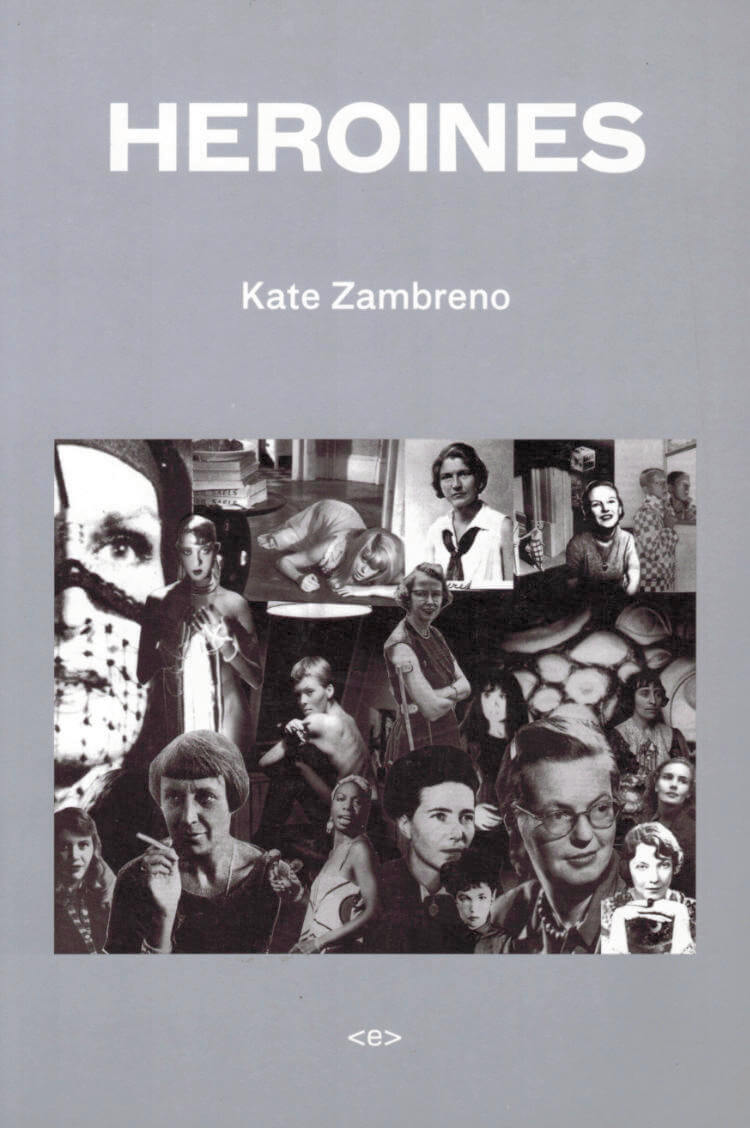
Heroines
A manifesto for "toxic girls" that reclaims the wives and mistresses of modernism for literature and feminism. On the last day of December, 2009 Kate Zambreno began a blog called Frances Farmer Is My Sister, arising from her obsession with the female modernists and her recent transplantation to Akron, Ohio, where her husband held a university job. Widely reposted, Zambreno's blog became an outlet for her highly informed and passionate rants about the fates of the modernist "wives and mistresses." In her blog entries, Zambreno reclaimed the traditionally pathologized biographies of Vivienne Eliot, Jane Bowles, Jean Rhys, and Zelda Fitzgerald: writers and artists themselves who served as male writers' muses only to end their lives silenced, erased, and institutionalized. Over the course of two years, Frances Farmer Is My Sister helped create a community where today's "toxic girls" could devise a new feminist discourse, writing in the margins and developing an alternative canon.
In Heroines, Zambreno extends the polemic begun on her blog into a dazzling, original work of literary scholarship. Combing theories that have dictated what literature should be and who is allowed to write it—from T. S. Eliot's New Criticism to the writings of such mid-century intellectuals as Elizabeth Hardwick and Mary McCarthy to the occasional "girl-on-girl crime" of the Second Wave of feminism—she traces the genesis of a cultural template that consistently exiles female experience to the realm of the "minor," and diagnoses women for transgressing social bounds. "ANXIETY: When she experiences it, it's pathological," writes Zambreno. "When he does, it's existential." By advancing the Girl-As-Philosopher, Zambreno reinvents feminism for her generation while providing a model for a newly subjectivized criticism.
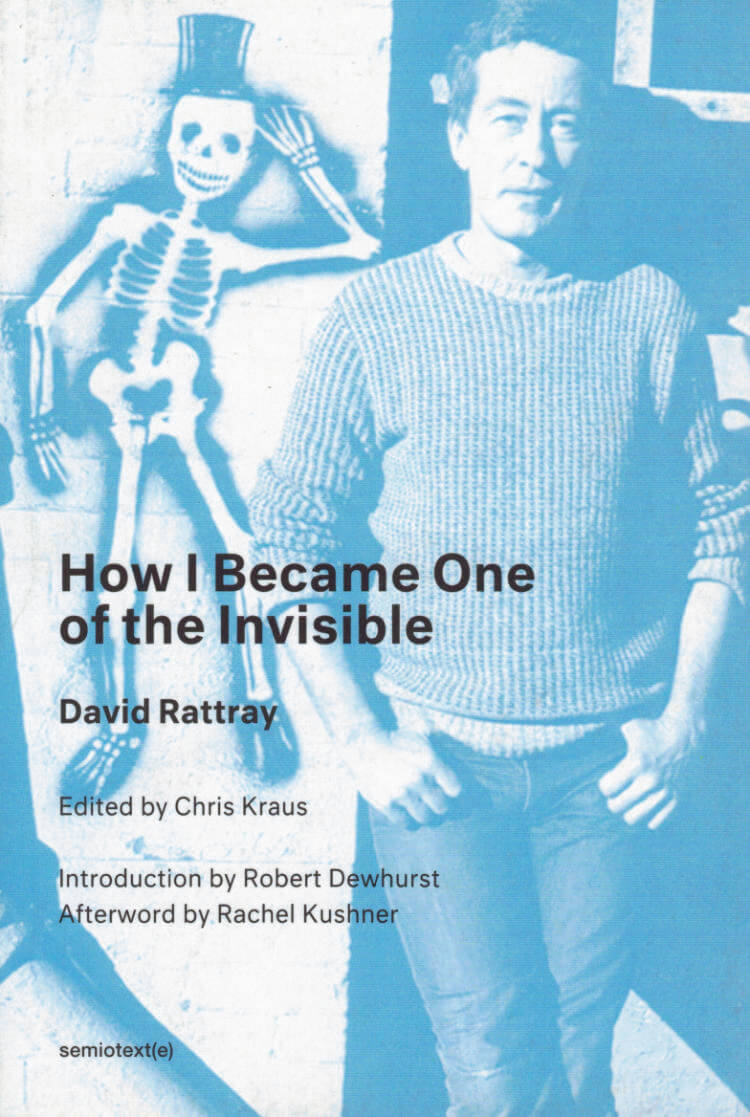
How I Became One of the Invisible
The only collection of Rattray's prose: essays that offer a kind of secret history and guidebook to a poetic and mystical tradition. Since its first publication in 1992, David Rattray's How I Became One of the Invisible has functioned as a kind of secret history and guidebook to a poetic and mystical tradition running through Western civilization from Pythagoras to In Nomine music to Hölderlin and Antonin Artaud. Rattray not only excavated this tradition, he embodied and lived it. He studied at Harvard and the Sorbonne but remained a poet, outside the academy. His stories "Van" and "The Angel" chronicle his travels in southern Mexico with his friend, the poet Van Buskirk, and his adventures after graduating from Dartmouth in the mid-1950s.
Eclipsed by the more mediagenic Beat writers during his lifetime, Rattray has become a powerful influence on contemporary artists and writers. Living in Paris, Rattray became the first English translator of Antonin Artaud, and he understood Artaud's incisive scholarship and technological prophecies as few others would.
As he writes of his translations in How I Became One of the Invisible, "You have to identify with the man or the woman. If you don't, then you shouldn't be translating it. Why would you translate something that you didn't think had an important message for other people? I translated Artaud because I wanted to turn my friends on and pass a message that had relevance to our lives. Not to get a grant, or be hired by an English department."
Compiled in the months before his untimely death at age 57, How I Became One of the Invisible is the only volume of Rattray's prose. This new edition, edited by Robert Dewhurst, includes five additional pieces, two of them previously unpublished.